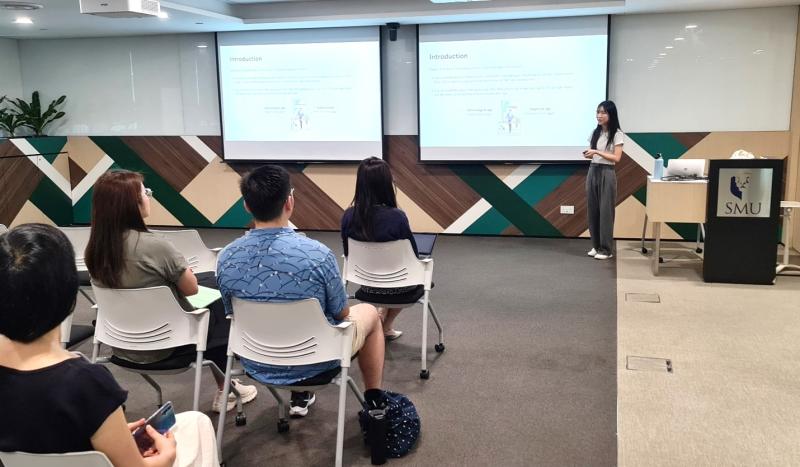The SMU College of Graduate Research Studies hosted a Brown-bag Seminar on 17 March 2023 on a highly relatable topic – "Loneliness and attitudes toward aging in middle-aged and older adults" – by student speaker, Gilaine NG Rui, a 4th Year PhD in Psychology candidate. The session was chaired by her supervisor, Professor YANG Hwajin, who is an Associate Professor of Psychology in the SMU School of Social Sciences.

Gilaine’s research examined how loneliness and repetitive negative thinking (RNT) shape attitudes toward ageing in middle-aged and older adults. Attitudes toward ageing refer to an individual’s expectations of what the ageing process would entail. These expectations have the ability to significantly impact developmental outcomes in mid- and later life, with more negative attitudes serving as a risk factor for cognitive decline and disorders, and more positive attitudes being associated with higher life satisfaction and a greater sense of resilience daily stressors, amongst other benefits.
Despite this, relatively little is known about how attitudes toward ageing are formed in middle-aged and older adults. Thus, Gilaine aimed to identify the potential factors that would shape attitudes toward ageing. Her focus on loneliness was driven by its significance as a growing public health issue among older adults. She also proposed that loneliness serves as an entry point to RNT, a repetitive pattern of thinking about problems and concerns, which may subsequently spill over to affect an individual’s expectation of ageing.
As past studies and current research had mainly focused on unidimensional aspects of attitudes toward ageing, Gilaine’s approach was to administer a multidimensional measure in her study to derive a more nuanced picture of how loneliness might affect the dimensions of psychosocial loss, psychological growth and physical changes, and if RNT would mediate these relations.
A total of 122 participants (ranging from 54 to 85 years of age) completed the study, which involved a series of scales designed to measure loneliness, RNT and attitudes towards ageing. Congruent with Gilaine’s hypothesis, results showed that RNT significantly mediated the relation between loneliness and the dimension of psychosocial loss, suggesting that the use of RNT in response to perceived isolation is a key contributor to greater expectations of later life as a time of social and functional loss.
Gilaine’s study advances the current body of literature that has sought to shed light on the bottom-up factors which shape attitudes towards ageing. Her work identifies several potentially modifiable factors and is therefore poised to facilitate the development of interventions for healthier ageing. We look forward to her expansion of research in this area and its impact on our ageing population.
Please stay tuned to the CGRS site for further updates on the next Brown-bag Seminar.
